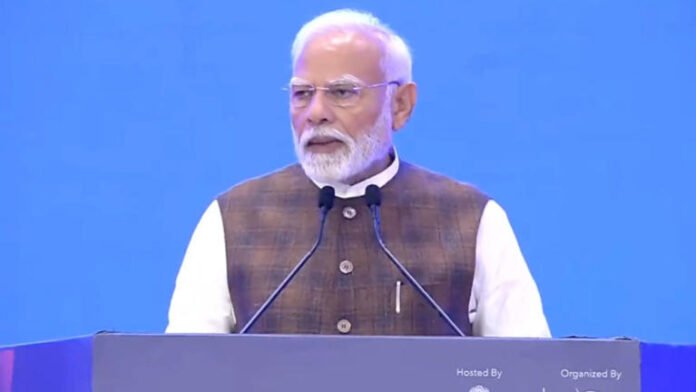On October 15, 2024, Prime Minister Narendra Modi inaugurated the prestigious India Mobile Congress (IMC) 2024 in New Delhi, highlighting India’s tremendous strides in democratizing digital technology and its growing global influence in the telecommunications sector. In his keynote address, PM Modi emphasized the nation’s commitment to making technology accessible to all, ensuring that the benefits of digital transformation are felt not just by the elite but by every Indian, irrespective of their location or economic background.
India Mobile Congress 2024: A Global Platform for Innovation
The India Mobile Congress (IMC) has become one of the largest digital technology events in Asia, bringing together key stakeholders from the telecom, IT, and digital sectors. This year’s event, themed “Enabling the Digital Future,” attracted participation from more than 200 exhibitors, including global tech giants, telecom operators, and startups showcasing cutting-edge innovations in areas such as 5G, artificial intelligence (AI), the Internet of Things (IoT), and digital infrastructure.
Inaugurating the event, PM Modi praised the IMC for being a catalyst in driving conversations around technology and its potential to transform societies. He highlighted how India, once seen as a country lagging behind in the tech race, has now emerged as a leader in digital innovation.
“India has not just adopted digital technology; we have democratized it. From the common man to multinational corporations, technology has become a tool of empowerment for everyone in India,” Modi remarked in his address to a packed audience of industry leaders, government officials, and innovators.
Democratization of Digital Technology
At the heart of PM Modi’s address was the theme of “democratization” of technology—ensuring that the benefits of the digital revolution reach every corner of India. He highlighted key government initiatives like Digital India, BharatNet, and the expansion of 5G services, which have played a transformative role in bridging the digital divide.
“The true power of technology lies in its ability to include and uplift. In India, we have ensured that technology is no longer the privilege of the few, but a right for all. From farmers to small entrepreneurs, students to professionals, everyone is harnessing the power of digital tools to improve their lives,” PM Modi stated.
One of the standout achievements of his government has been the massive push to improve digital infrastructure in rural areas. BharatNet, the government’s flagship program to connect rural India with high-speed broadband, is nearing completion. With over 250,000 gram panchayats (village councils) already connected, this initiative has brought the internet to millions of rural households, opening up new opportunities for education, healthcare, and e-commerce.
5G Rollout: A Game Changer for India
PM Modi also highlighted the rapid rollout of 5G services across the country, calling it a “game changer” for India’s economy and its technological ambitions. He pointed out that the introduction of 5G has already revolutionized industries like agriculture, healthcare, and education by enabling smart solutions that were previously unimaginable.
“In a short span of time, we have brought 5G to every corner of the country. Today, India is not only a consumer of advanced technologies but also a leader in developing new applications and innovations in 5G,” Modi said.
He also emphasized that India’s advancements in 5G technology will pave the way for the next frontier: 6G. India, Modi stated, is already working with global partners to lead the research and development efforts for future communication technologies.
Digital Public Goods: A Model for the World
PM Modi’s speech also underlined India’s success in creating digital public goods that serve as models for other nations. He cited the Unified Payments Interface (UPI) as a prime example of how India has democratized digital payments. UPI, which has become one of the most successful real-time payment systems in the world, has transformed the way Indians conduct transactions, particularly in the post-pandemic digital economy.
“Today, UPI is being embraced by countries across the world. It is not just a payment system; it is a symbol of how technology, when designed with inclusivity in mind, can be a force for good,” PM Modi said.
Other digital public goods mentioned by the Prime Minister included Aadhaar, the world’s largest biometric identification system, and CoWIN, the digital platform used to manage India’s COVID-19 vaccination drive. Both have become global benchmarks in leveraging technology for efficient governance and service delivery.
Empowering Startups and Innovation
PM Modi also spoke about India’s thriving startup ecosystem, which has been empowered by digital platforms and government support. He lauded Indian startups for their role in developing innovative solutions across sectors such as healthcare, education, fintech, and agriculture.
“India today is home to one of the world’s largest startup ecosystems. Our young innovators are not just creating products for India, but for the world. Their solutions are a testimony to our commitment to using technology for human progress,” PM Modi stated.
Global Collaboration for a Digital Future
Concluding his address, PM Modi emphasized the importance of global collaboration in shaping the digital future. He urged nations to work together to ensure that technology remains inclusive, resilient, and a force for good in the world.
“India is ready to work with all nations in shaping a digital future that is not just advanced, but accessible and equitable for all. Let us ensure that no one is left behind in this digital revolution,” he said.
As India continues its journey towards becoming a global digital powerhouse, PM Modi’s vision for an inclusive, technology-driven future resonated strongly at the India Mobile Congress 2024, reinforcing the nation’s commitment to democratizing digital technology for all its citizens.

